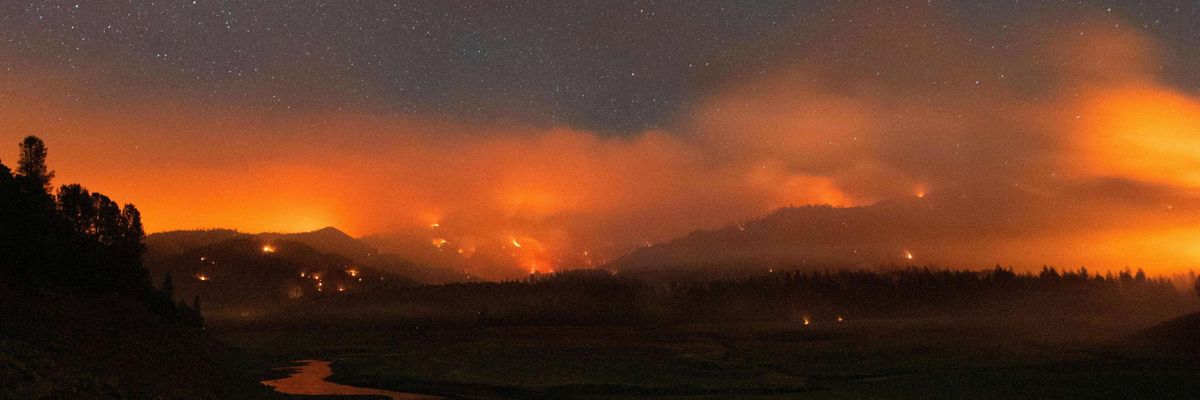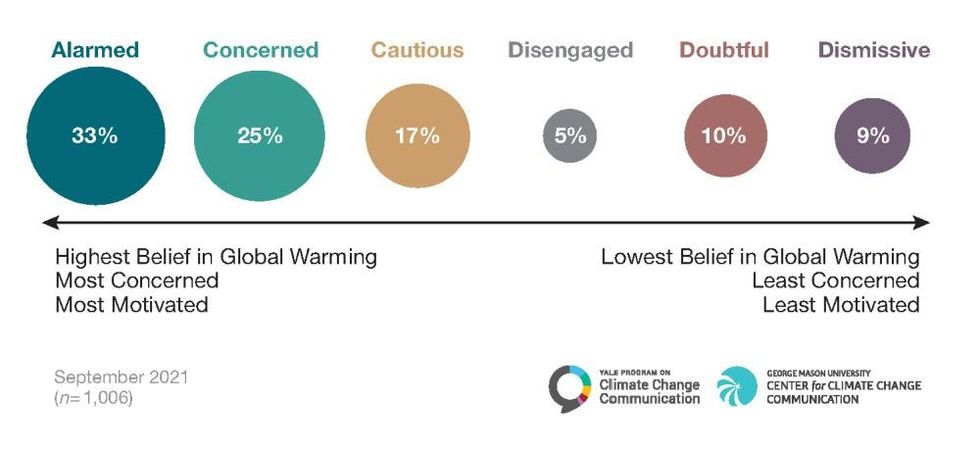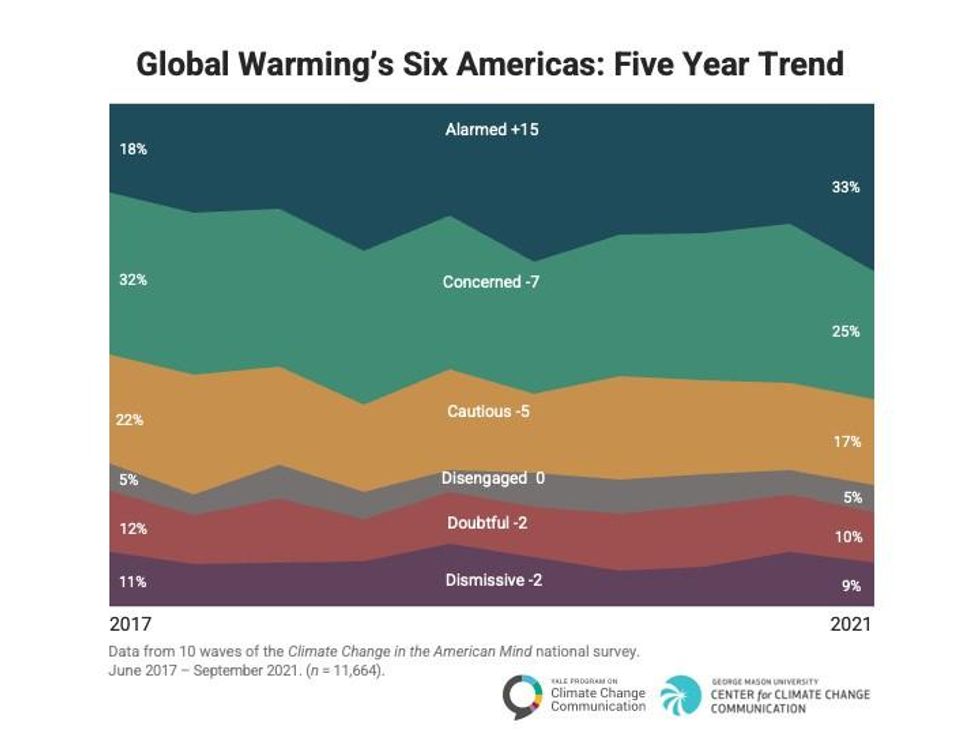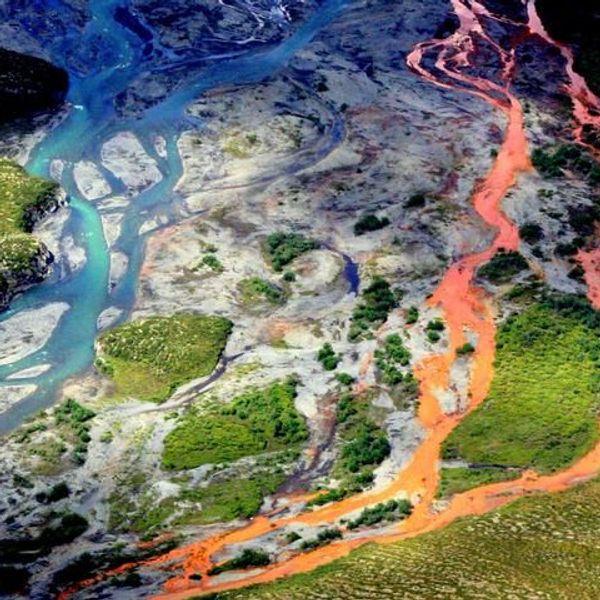
Flames surround the drought-stricken Shasta Lake in Lakehead, California on July 2, 2021. (Photo: Josh Edelson/AFP via Getty Images)
'Terrifying' Hot Streak Continues as NOAA Says 2021 6th Warmest Year on Record
The analysis comes as a new survey shows a growing number of Americans are "alarmed" about the climate emergency.
Amid rising public alarm about human-caused global heating, U.S. government scientists announced Thursday that 2021 was the sixth hottest year since records began in 1880.
"Failure to act together with the global community will all but ensure more devastating impacts and even irreversible climate tipping points."
Separate but similar analyses from the National Aeronautics and Space Administration (NASA) and National Oceanic and Atmospheric Administration (NOAA) reached the same conclusion, mostly aligning with the European Union's Copernicus, which recently ranked 2021 fifth warmest.
Both NASA and NOAA noted that the average global temperature last year was about 1.5degC above the 20th-century figures used by each agency.
"Science leaves no room for doubt: Climate change is the existential threat of our time," said NASA Administrator Bill Nelson in a statement.
"Eight of the top 10 warmest years on our planet occurred in the last decade, an indisputable fact that underscores the need for bold action to safeguard the future of our country--and all of humanity," Nelson added.
While NOAA's findings indicate that "the years 2013-2021 all rank among the 10-warmest years on record," Gavin Schmidt, director of NASA's Goddard Institute for Space Studies, highlighted the similarities found by the government scientists over the past decade.
"The complexity of the various analyses doesn't matter because the signals are so strong," Schmidt said. "The trends are all the same because the trends are so large."
\u201c(1/6) It\u2019s official: 2021 was Earth\u2019s 6th-warmest year on record according to NOAA and @NASA scientists. \n\nThe average global surface temperature rose 1.51\u00b0F (0.84\u00b0C) above average, per findings by @NOAANCEI. https://t.co/y7Qo2bB2Qh #StateOfClimate\u201d— NOAA (@NOAA) 1642090212
Kristina Dahl, a senior climate scientist at the Union of Concerned Scientists, noted those trends in a statement about the "terrifying" findings.
"What terrifies me about the latest data showing 2021 ranks as the sixth hottest year on record is that these facts and figures are no longer surprising or shocking," she said. "Rising temperatures are already triggering dire impacts worldwide and will only worsen as the planet warms."
Pointing out that "scientific research shows the deadly 2021 Pacific Northwest heatwave, for example, would've been virtually impossible without climate change," Dahl declared that "it's time for policymakers to take decisive actions and pass policies that sharply rein in heat-trapping emissions, such as the Build Back Better Act."
The Build Back Better Act includes climate policies promised by President Joe Biden, who aims to halve U.S. emissions from 2005 levels this decade. House Democrats approved the sweeping package in November, but it has been held up by Sens. Joe Manchin (D-W.Va.) and Kyrsten Sinema (D-Ariz.).
"Failure to act together with the global community will all but ensure more devastating impacts and even irreversible climate tipping points," Dahl warned. "In 2022, we need bold leaders who prioritize the well-being of people and the planet, not incrementalism or regression from those beholden to the fossil fuel industry."
The government analyses and resulting calls for action come as a record number of U.S. adults are worried about the climate emergency, according to polling results released Thursday by the Yale Program on Climate Change Communication and the George Mason University Center for Climate Change Communication.
Surveys conducted from October 2008 to September 2021 grouped respondents into six categories. As the researchers explained in a statement:
The Alarmed are the most engaged, are very worried about global warming, and strongly support climate action. The Concerned think global warming is a significant threat but prioritize it less and are less likely to be taking action. The Cautious are aware of climate change but are uncertain about its causes and are not very worried about it. The Disengaged are largely unaware of global warming, while the Doubtful doubt it is happening or human-caused and perceive it as a low risk. The Dismissive firmly reject the reality of human-caused global warming and oppose most climate change policies.
In the most recent poll, the researchers noted, "the Alarmed (33%) outnumber the Dismissive (9%) by more than 3 to 1" and "about six in 10 Americans (59%) are either Alarmed or Concerned, while only about 2 in 10 (19%) are Doubtful or Dismissive."

Over the past five years, the Alarmed segment has nearly doubled, jumping from 18% to 33%, including a rise of nine percentage points between March and September of last year.
"Americans' understanding of global warming's reality and risks, and support for climate action is growing," the researchers said. "The growth of the Alarmed segment, in particular, is encouraging because progress on climate change requires strong, coordinated, and sustained action, and the Alarmed are the most likely to demand and support these actions by leaders."

However, the researchers also warned that climate-minded people nationwide still need to be "organized and mobilized to demand action at all levels of American society."
"The Concerned and Cautious (42% of U.S. adults) do not yet fully understand the threat of climate impacts or the urgency of climate action," they pointed out, "despite the fact that global warming is already harming communities across America--including increasingly extreme weather, impacts on human health, and human and economic disasters."
An Urgent Message From Our Co-Founder
Dear Common Dreams reader, The U.S. is on a fast track to authoritarianism like nothing I've ever seen. Meanwhile, corporate news outlets are utterly capitulating to Trump, twisting their coverage to avoid drawing his ire while lining up to stuff cash in his pockets. That's why I believe that Common Dreams is doing the best and most consequential reporting that we've ever done. Our small but mighty team is a progressive reporting powerhouse, covering the news every day that the corporate media never will. Our mission has always been simple: To inform. To inspire. And to ignite change for the common good. Now here's the key piece that I want all our readers to understand: None of this would be possible without your financial support. That's not just some fundraising cliche. It's the absolute and literal truth. We don't accept corporate advertising and never will. We don't have a paywall because we don't think people should be blocked from critical news based on their ability to pay. Everything we do is funded by the donations of readers like you. Will you donate now to help power the nonprofit, independent reporting of Common Dreams? Thank you for being a vital member of our community. Together, we can keep independent journalism alive when it’s needed most. - Craig Brown, Co-founder |
Amid rising public alarm about human-caused global heating, U.S. government scientists announced Thursday that 2021 was the sixth hottest year since records began in 1880.
"Failure to act together with the global community will all but ensure more devastating impacts and even irreversible climate tipping points."
Separate but similar analyses from the National Aeronautics and Space Administration (NASA) and National Oceanic and Atmospheric Administration (NOAA) reached the same conclusion, mostly aligning with the European Union's Copernicus, which recently ranked 2021 fifth warmest.
Both NASA and NOAA noted that the average global temperature last year was about 1.5degC above the 20th-century figures used by each agency.
"Science leaves no room for doubt: Climate change is the existential threat of our time," said NASA Administrator Bill Nelson in a statement.
"Eight of the top 10 warmest years on our planet occurred in the last decade, an indisputable fact that underscores the need for bold action to safeguard the future of our country--and all of humanity," Nelson added.
While NOAA's findings indicate that "the years 2013-2021 all rank among the 10-warmest years on record," Gavin Schmidt, director of NASA's Goddard Institute for Space Studies, highlighted the similarities found by the government scientists over the past decade.
"The complexity of the various analyses doesn't matter because the signals are so strong," Schmidt said. "The trends are all the same because the trends are so large."
\u201c(1/6) It\u2019s official: 2021 was Earth\u2019s 6th-warmest year on record according to NOAA and @NASA scientists. \n\nThe average global surface temperature rose 1.51\u00b0F (0.84\u00b0C) above average, per findings by @NOAANCEI. https://t.co/y7Qo2bB2Qh #StateOfClimate\u201d— NOAA (@NOAA) 1642090212
Kristina Dahl, a senior climate scientist at the Union of Concerned Scientists, noted those trends in a statement about the "terrifying" findings.
"What terrifies me about the latest data showing 2021 ranks as the sixth hottest year on record is that these facts and figures are no longer surprising or shocking," she said. "Rising temperatures are already triggering dire impacts worldwide and will only worsen as the planet warms."
Pointing out that "scientific research shows the deadly 2021 Pacific Northwest heatwave, for example, would've been virtually impossible without climate change," Dahl declared that "it's time for policymakers to take decisive actions and pass policies that sharply rein in heat-trapping emissions, such as the Build Back Better Act."
The Build Back Better Act includes climate policies promised by President Joe Biden, who aims to halve U.S. emissions from 2005 levels this decade. House Democrats approved the sweeping package in November, but it has been held up by Sens. Joe Manchin (D-W.Va.) and Kyrsten Sinema (D-Ariz.).
"Failure to act together with the global community will all but ensure more devastating impacts and even irreversible climate tipping points," Dahl warned. "In 2022, we need bold leaders who prioritize the well-being of people and the planet, not incrementalism or regression from those beholden to the fossil fuel industry."
The government analyses and resulting calls for action come as a record number of U.S. adults are worried about the climate emergency, according to polling results released Thursday by the Yale Program on Climate Change Communication and the George Mason University Center for Climate Change Communication.
Surveys conducted from October 2008 to September 2021 grouped respondents into six categories. As the researchers explained in a statement:
The Alarmed are the most engaged, are very worried about global warming, and strongly support climate action. The Concerned think global warming is a significant threat but prioritize it less and are less likely to be taking action. The Cautious are aware of climate change but are uncertain about its causes and are not very worried about it. The Disengaged are largely unaware of global warming, while the Doubtful doubt it is happening or human-caused and perceive it as a low risk. The Dismissive firmly reject the reality of human-caused global warming and oppose most climate change policies.
In the most recent poll, the researchers noted, "the Alarmed (33%) outnumber the Dismissive (9%) by more than 3 to 1" and "about six in 10 Americans (59%) are either Alarmed or Concerned, while only about 2 in 10 (19%) are Doubtful or Dismissive."

Over the past five years, the Alarmed segment has nearly doubled, jumping from 18% to 33%, including a rise of nine percentage points between March and September of last year.
"Americans' understanding of global warming's reality and risks, and support for climate action is growing," the researchers said. "The growth of the Alarmed segment, in particular, is encouraging because progress on climate change requires strong, coordinated, and sustained action, and the Alarmed are the most likely to demand and support these actions by leaders."

However, the researchers also warned that climate-minded people nationwide still need to be "organized and mobilized to demand action at all levels of American society."
"The Concerned and Cautious (42% of U.S. adults) do not yet fully understand the threat of climate impacts or the urgency of climate action," they pointed out, "despite the fact that global warming is already harming communities across America--including increasingly extreme weather, impacts on human health, and human and economic disasters."
Amid rising public alarm about human-caused global heating, U.S. government scientists announced Thursday that 2021 was the sixth hottest year since records began in 1880.
"Failure to act together with the global community will all but ensure more devastating impacts and even irreversible climate tipping points."
Separate but similar analyses from the National Aeronautics and Space Administration (NASA) and National Oceanic and Atmospheric Administration (NOAA) reached the same conclusion, mostly aligning with the European Union's Copernicus, which recently ranked 2021 fifth warmest.
Both NASA and NOAA noted that the average global temperature last year was about 1.5degC above the 20th-century figures used by each agency.
"Science leaves no room for doubt: Climate change is the existential threat of our time," said NASA Administrator Bill Nelson in a statement.
"Eight of the top 10 warmest years on our planet occurred in the last decade, an indisputable fact that underscores the need for bold action to safeguard the future of our country--and all of humanity," Nelson added.
While NOAA's findings indicate that "the years 2013-2021 all rank among the 10-warmest years on record," Gavin Schmidt, director of NASA's Goddard Institute for Space Studies, highlighted the similarities found by the government scientists over the past decade.
"The complexity of the various analyses doesn't matter because the signals are so strong," Schmidt said. "The trends are all the same because the trends are so large."
\u201c(1/6) It\u2019s official: 2021 was Earth\u2019s 6th-warmest year on record according to NOAA and @NASA scientists. \n\nThe average global surface temperature rose 1.51\u00b0F (0.84\u00b0C) above average, per findings by @NOAANCEI. https://t.co/y7Qo2bB2Qh #StateOfClimate\u201d— NOAA (@NOAA) 1642090212
Kristina Dahl, a senior climate scientist at the Union of Concerned Scientists, noted those trends in a statement about the "terrifying" findings.
"What terrifies me about the latest data showing 2021 ranks as the sixth hottest year on record is that these facts and figures are no longer surprising or shocking," she said. "Rising temperatures are already triggering dire impacts worldwide and will only worsen as the planet warms."
Pointing out that "scientific research shows the deadly 2021 Pacific Northwest heatwave, for example, would've been virtually impossible without climate change," Dahl declared that "it's time for policymakers to take decisive actions and pass policies that sharply rein in heat-trapping emissions, such as the Build Back Better Act."
The Build Back Better Act includes climate policies promised by President Joe Biden, who aims to halve U.S. emissions from 2005 levels this decade. House Democrats approved the sweeping package in November, but it has been held up by Sens. Joe Manchin (D-W.Va.) and Kyrsten Sinema (D-Ariz.).
"Failure to act together with the global community will all but ensure more devastating impacts and even irreversible climate tipping points," Dahl warned. "In 2022, we need bold leaders who prioritize the well-being of people and the planet, not incrementalism or regression from those beholden to the fossil fuel industry."
The government analyses and resulting calls for action come as a record number of U.S. adults are worried about the climate emergency, according to polling results released Thursday by the Yale Program on Climate Change Communication and the George Mason University Center for Climate Change Communication.
Surveys conducted from October 2008 to September 2021 grouped respondents into six categories. As the researchers explained in a statement:
The Alarmed are the most engaged, are very worried about global warming, and strongly support climate action. The Concerned think global warming is a significant threat but prioritize it less and are less likely to be taking action. The Cautious are aware of climate change but are uncertain about its causes and are not very worried about it. The Disengaged are largely unaware of global warming, while the Doubtful doubt it is happening or human-caused and perceive it as a low risk. The Dismissive firmly reject the reality of human-caused global warming and oppose most climate change policies.
In the most recent poll, the researchers noted, "the Alarmed (33%) outnumber the Dismissive (9%) by more than 3 to 1" and "about six in 10 Americans (59%) are either Alarmed or Concerned, while only about 2 in 10 (19%) are Doubtful or Dismissive."

Over the past five years, the Alarmed segment has nearly doubled, jumping from 18% to 33%, including a rise of nine percentage points between March and September of last year.
"Americans' understanding of global warming's reality and risks, and support for climate action is growing," the researchers said. "The growth of the Alarmed segment, in particular, is encouraging because progress on climate change requires strong, coordinated, and sustained action, and the Alarmed are the most likely to demand and support these actions by leaders."

However, the researchers also warned that climate-minded people nationwide still need to be "organized and mobilized to demand action at all levels of American society."
"The Concerned and Cautious (42% of U.S. adults) do not yet fully understand the threat of climate impacts or the urgency of climate action," they pointed out, "despite the fact that global warming is already harming communities across America--including increasingly extreme weather, impacts on human health, and human and economic disasters."

